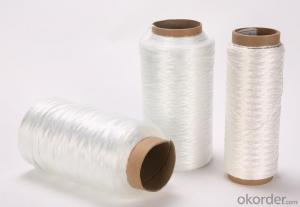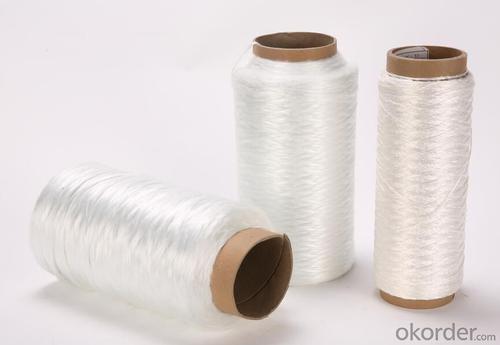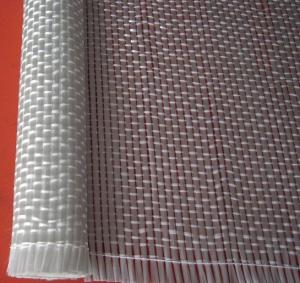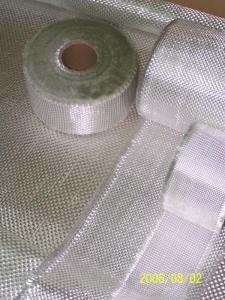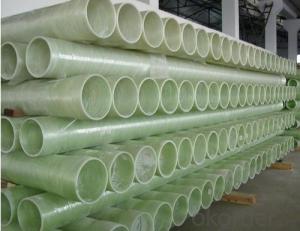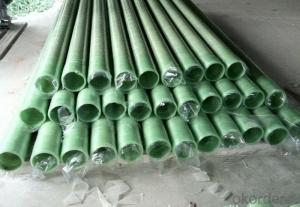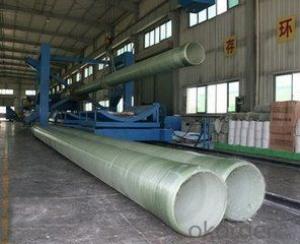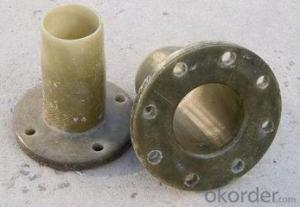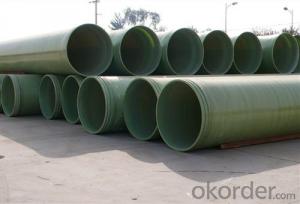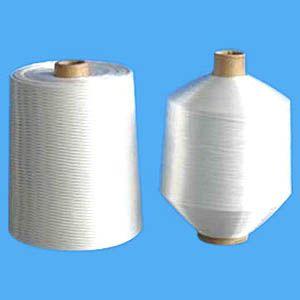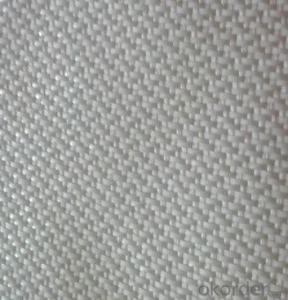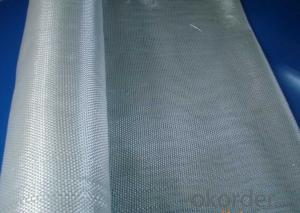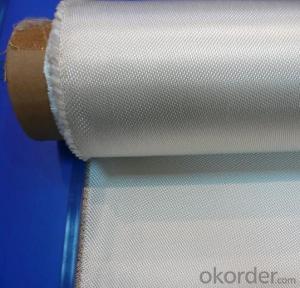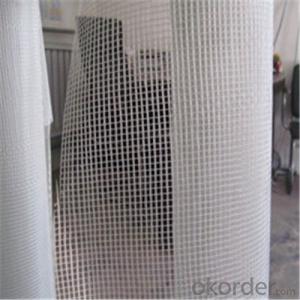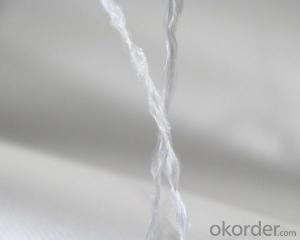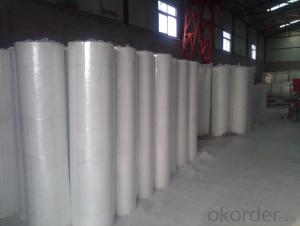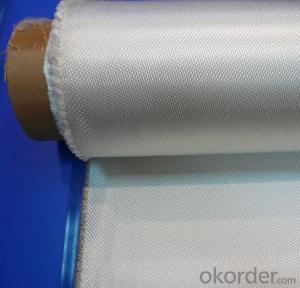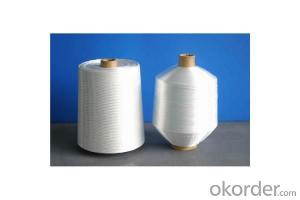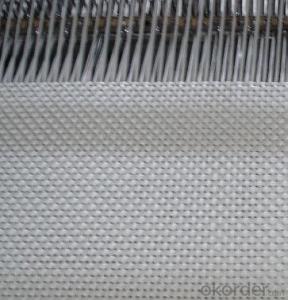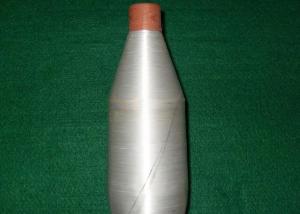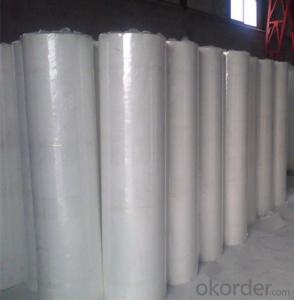Fiberglass Yarn - High Strength Non-Alkali Fiberglass Yarn
- Loading Port:
- Ningbo
- Payment Terms:
- TT OR LC
- Min Order Qty:
- 500 kg
- Supply Capability:
- 300000 kg/month
OKorder Service Pledge
OKorder Financial Service
You Might Also Like
Description: Fiberglass yarn is a fiberglass twisting yarn.Its high strength, corrosion resistance, high temperature resistant, moisture absorption, good electrical insulating performance, used in weaving, casing, mine fuse wire and cable coating layer, the windings of electric machines and appliances insulating material, various machine weaving yarn and other industrial yarn.
Features: high temperature, chemical, and abrasion resistance, fire retardant

PRICE: USD7 per kilogram
UNIT: Kilogram
MOQ: 100 KGS
Weight: 0.7kg, 2kg, 4kg
Yarn Type: E-glass
Product name: Fiberglass Yarn
Diameter: 3-9um
Linear Density: 33tex
Alkali content: Alkali free
Material: fiberglass
Surface Treatment: Vinyl Coated
Yarn Structure: Single Yarn
Supply ability: 5000 Ton/Tons per Day
Packaging: opp bag, then carton box
Lead time: 7-30 days
- Q: Can fiberglass yarn withstand high temperatures?
- Indeed, high temperatures pose no challenge to fiberglass yarn. Renowned for its exceptional capacity to resist heat, fiberglass is ideal for a myriad of applications that involve exposure to extreme temperatures. In comparison to other textile fibers, fiberglass boasts a melting point of approximately 2000°F (1093°C), a significantly higher threshold. Consequently, fiberglass yarn finds great favor in industries like insulation, aerospace, automotive, and fire protection. Its ability to endure intense heat without warping, melting, or compromising its strength renders it an unwavering material for environments characterized by elevated temperatures.
- Q: Is fiberglass yarn resistant to stains?
- Yes, fiberglass yarn is resistant to stains. The nature of fiberglass, being a synthetic material, makes it highly resistant to most types of stains. This is due to its non-absorbent properties, which prevent liquids or substances from penetrating the surface of the yarn and causing permanent stains. Additionally, fiberglass yarn is typically coated with a protective layer that further enhances its stain resistance. As a result, it is commonly used in applications where stain resistance is crucial, such as in the production of carpets, upholstery, and textiles. However, it is important to note that while fiberglass yarn is highly resistant to stains, it may still be susceptible to certain substances or chemicals that could potentially cause discoloration. Therefore, it is advisable to follow any recommended cleaning and maintenance instructions provided by the manufacturer to ensure the longevity and stain resistance of fiberglass yarn products.
- Q: Can fiberglass yarn be used in shipbuilding?
- Fiberglass yarn has the capability to be utilized in shipbuilding. Being both sturdy and lightweight, fiberglass yarn is appropriate for a variety of applications in the marine industry. Its common use in shipbuilding involves reinforcing composite materials like fiberglass-reinforced plastic (FRP) composites. These composites are integral in constructing boat hulls, decks, and other structural components, as they provide enhanced strength and durability. Additionally, fiberglass yarn possesses corrosion resistance, a significant trait for shipbuilding materials. In conclusion, fiberglass yarn is a versatile substance that can effectively contribute to the construction of ships and other marine vessels.
- Q: Can fiberglass yarn be used in insulation materials?
- Insulation materials can indeed utilize fiberglass yarn. Such yarn is created by spinning molten glass into fibers, which are then woven together to form a yarn. This yarn can serve as a reinforcement material in insulation products, thereby enhancing their strength and resistance to tearing or breaking. Furthermore, fiberglass yarn possesses outstanding thermal insulation properties, making it a perfect option for insulation materials. It effectively traps air and prevents heat transfer, thereby ensuring buildings remain cool during summer and warm throughout winter. Ultimately, due to its strength and thermal insulation capabilities, fiberglass yarn is widely employed as a crucial component in insulation materials.
- Q: Can fiberglass yarn be used for curtains and drapes?
- Yes, fiberglass yarn can be used for curtains and drapes. Fiberglass yarn is a durable and versatile material that offers several benefits for curtains and drapes. It is known for its strength, resistance to tearing, and long-lasting nature. Fiberglass yarn is also fire-resistant, making it a safe choice for curtains and drapes. Additionally, it is lightweight and easy to handle, allowing for easy installation and maintenance. Overall, fiberglass yarn can be a great option for curtains and drapes, providing durability, safety, and a wide range of design possibilities.
- Q: Can fiberglass yarn be used for reinforcement purposes?
- Yes, fiberglass yarn can be used for reinforcement purposes. It is commonly used in various industries, such as construction, automotive, and aerospace, to reinforce materials and provide strength and durability. The high tensile strength and resistance to heat and chemicals make fiberglass yarn an ideal choice for reinforcement applications.
- Q: Can fiberglass yarn be used for reinforcement in pipes?
- Yes, fiberglass yarn can be used for reinforcement in pipes. It is commonly used as a strong and durable material to improve the structural integrity of pipes and enhance their resistance to pressure, corrosion, and other external factors.
- Q: How does fiberglass yarn compare to other yarn materials?
- Fiberglass yarn is a unique material that offers several advantages when compared to other yarn materials. Firstly, fiberglass yarn is incredibly strong and durable, making it ideal for applications that require high tensile strength. It can withstand heavy loads and does not easily break or stretch like other yarn materials such as cotton or wool. This strength also makes fiberglass yarn resistant to abrasion, ensuring its longevity and performance over time. Secondly, fiberglass yarn is highly heat-resistant. It can withstand extremely high temperatures without melting or losing its structural integrity. This property makes it suitable for use in applications where heat resistance is crucial, such as insulation, fireproofing, and electrical components. Additionally, fiberglass yarn is highly resistant to chemicals and corrosion. It does not react with most chemicals or solvents, making it an excellent choice for applications that involve exposure to harsh chemicals or corrosive environments. This resistance to corrosion ensures that fiberglass yarn remains intact and functional, even in challenging conditions. Furthermore, fiberglass yarn is lightweight and has excellent dimensional stability. It is not prone to shrinking or expanding when exposed to moisture or changes in temperature. This stability makes it an ideal material for precision applications, where accuracy and consistency are essential. However, it is important to note that fiberglass yarn also has some limitations. It is not as soft or flexible as natural yarn materials like cotton or wool, which may limit its use in certain textile applications. Additionally, fiberglass yarn can be more expensive than other yarn materials due to its unique properties and manufacturing process. In conclusion, fiberglass yarn offers several advantages when compared to other yarn materials. Its strength, heat resistance, chemical resistance, corrosion resistance, and dimensional stability make it a versatile material that can be used in various industries and applications. However, it is essential to consider the specific requirements of each project and the limitations of fiberglass yarn before choosing it as a yarn material.
- Q: Can fiberglass yarn be used for making swimwear?
- Yes, fiberglass yarn can be used for making swimwear. Fiberglass is a strong and durable material that is resistant to water and chemicals. It can provide excellent support and shape retention, making it ideal for swimwear. Additionally, fiberglass yarn is lightweight and has a smooth surface, providing a comfortable and sleek fit. However, it is important to note that fiberglass can be irritating to the skin, so proper lining or coating may be necessary to ensure comfort and safety.
- Q: Is fiberglass yarn resistant to tearing or ripping?
- Fiberglass yarn, being made from tightly woven strands of glass fibers, exhibits remarkable resistance against tearing and ripping. Its tightly woven structure effectively thwarts any attempts at tearing or ripping, even under regular circumstances. Moreover, fiberglass yarn boasts a commendable tensile strength, further bolstering its ability to resist tearing or ripping. Consequently, fiberglass yarn proves to be an excellent option for industries seeking a durable and tear-resistant material, particularly in textile manufacturing, composite reinforcements, and insulation production.
Send your message to us
Fiberglass Yarn - High Strength Non-Alkali Fiberglass Yarn
- Loading Port:
- Ningbo
- Payment Terms:
- TT OR LC
- Min Order Qty:
- 500 kg
- Supply Capability:
- 300000 kg/month
OKorder Service Pledge
OKorder Financial Service
Similar products
Hot products
Hot Searches
Related keywords
